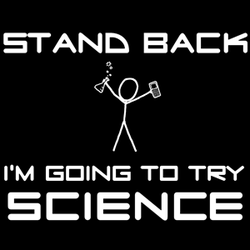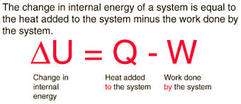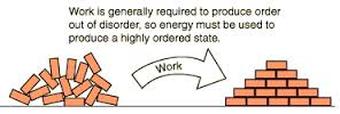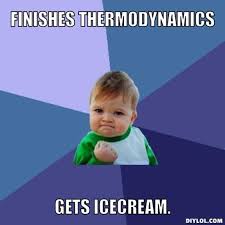
By Craven
You've all heard it before. The umbrella fat loss phrase people mindless recite when talking about calories.
It always goes something along the lines of "You've got to burn more calories than you consume! It's thermodynamics!"
Um, not exactly.
It's easy to see the people who seem to like repeating this phrase evidently haven't read a basic paragraph on what the laws of thermodynamics are. Maybe throwing in a sciency-word like thermodynamics will add credibility to their point?
You've all heard it before. The umbrella fat loss phrase people mindless recite when talking about calories.
It always goes something along the lines of "You've got to burn more calories than you consume! It's thermodynamics!"
Um, not exactly.
It's easy to see the people who seem to like repeating this phrase evidently haven't read a basic paragraph on what the laws of thermodynamics are. Maybe throwing in a sciency-word like thermodynamics will add credibility to their point?
All calories aren't created equal.
I'm going to make this post as clear and concise as possible to illustrate how just simply eating at a caloric deficit won't always prove to facilitate weight loss. There's going to be some basic science stuff thrown in, but It's not that complicated.
First Law Of Thermodynamics
The first law states that in a thermodynamic process the increment in the internal energy of a system is equal to the increment of heat supplied to the system, minus the increment of work done by the system on its surroundings. Basically the conservation of energy.
You've probably heard this to be “energy can neither be created nor destroyed”.
This is typically what people tend to refer to when saying "its thermodynamics." Why not a wildly inaccurate statement, it's a 'law" that cannot adequately be applied to a system as complex as the human body. There's three main reason's why:
This is typically what people tend to refer to when saying "its thermodynamics." Why not a wildly inaccurate statement, it's a 'law" that cannot adequately be applied to a system as complex as the human body. There's three main reason's why:
- It assumes that the only option your body has regarding calories in to burn them or store them. Carbohydrates work exactly in that manner, but protein and fats have other needs and uses in the body before being used as an energy source. Protein provides amino acids and raw material for cell maintaince and repair, while fats transport non water soluable nutrients and repair cell membranes. A cool analogy I learned about protein fat is it's a lot like how we use wood in our lives: You can burn it for fuel, but you can also build a house with it or make it into a piece of paper. At any rate, the calories in the proteins and fats used in this manner are neither burned nor stored. So we have our first hole in the calories in/calories out equation
- It assumes all Basal Metabolic Rates are predictable and stable. Your BMR is the number of calories your body requires just to keep you alive and functioning. Your BMR is not stable and quickly adapts to caloric decreases/increases by slowing down. I illustrated this in my previous article on training and nutrtion for women. There's a prime example of how fat loss stalls because your body effectively adapts to energy needs and caloric restriction in order to expend the least amount of energy in order to sustain itself. The term is know as metabolic adaption and it's very real.
- Your body is not an "ideal" thermodynamic machine". In thermodynamics, the term 'ideal' means perfectly efficient. The second law of thermodynamics introduces a concept called entropy; entropy basically means there is energy used to produce work and no system can ever be 100% efficient. An easy way to picture this is by examining your vehicles gas engine. In order for the gasoliine to run the engine, it must be ignited and combusted in order to produce a reaction that will create work. Because of this reaction of the fuel, a lot of heat is lost as entropy (about 50%) and only half of the stored energy of the gasoline is efficiently used. This is exactly what happens to the fuels in your body, and there are a vast number of variables that effect the efficiency of the fuel your bodies using. Variables such as genetics, environment, HORMONES, caloric restritcions, time of day, BMR, hydration levels, chemicals, stresses, etc.
The Second Law of Thermodynamics
I pretty much covered it in my third point mentioned above, but let's a bit further into this.
The second law was developed to understand the efficiency of machines and describes the limits of efficiency in irreversible systems and processes. The term irreversible simply means a reaction that usually requires OR produces heat, such as chemical reactions, friction, and metabolic processes, which produce order from a disordered system.
The first law can be applied to a reversible processes (ideal situations, mostly for record keeping) as there is no energy lost because all the energy in the system has been conserved. This isn't the case for the second law as energy is lost as heat in the reaction required to produce work (car engine above). If a 'calorie is a calorie' were true, nobody would pay extra for high test gasoline!
I pretty much covered it in my third point mentioned above, but let's a bit further into this.
The second law was developed to understand the efficiency of machines and describes the limits of efficiency in irreversible systems and processes. The term irreversible simply means a reaction that usually requires OR produces heat, such as chemical reactions, friction, and metabolic processes, which produce order from a disordered system.
The first law can be applied to a reversible processes (ideal situations, mostly for record keeping) as there is no energy lost because all the energy in the system has been conserved. This isn't the case for the second law as energy is lost as heat in the reaction required to produce work (car engine above). If a 'calorie is a calorie' were true, nobody would pay extra for high test gasoline!
Thermogenesis
Have you ever felt warm and a bit uncomfortable after a large meal? Especially a large carb-laden meal? This is due to the thermic nature of food. This is because all food requires some extra heat to be processed. The thermic effect of nutrients is approximates 2-3% for fats, 6-9% for carbs, and 25-30% for proteins. This alone should make the case that all calories are not equal as they require different amounts of heat to be processed by your body!
Have you ever felt warm and a bit uncomfortable after a large meal? Especially a large carb-laden meal? This is due to the thermic nature of food. This is because all food requires some extra heat to be processed. The thermic effect of nutrients is approximates 2-3% for fats, 6-9% for carbs, and 25-30% for proteins. This alone should make the case that all calories are not equal as they require different amounts of heat to be processed by your body!
Okay, guy. What does this all mean?
I'm glad you asked. The point I've tried to make is don't believe all of your calories will be the same. Here's a few basic examples:
100 calories of protein IS NOT equivalent to 100 grams of carbs.
If you have a meal consisting of purely chicken breast (protein) versus a meal of purely fruit (carbs), you'll get an extremely different response from each of the two foods.
Protein does not signal an insulin response the same way carbs do. A meal of pure protein will have a higher thermic effect to be processed and does not have a high potential to be stored as fat. At the other end, the meal of pure carbs will signal a large insulin response, which is usually not a good thing for most people. The insulin response will want to move sugar from the blood stream as quickly as possible, storing glucose in muscle (hopefully) AND fat cells, especially if muscles are all ready saturated, and they usually are in higher carb diets.
So you you can see the effect the two different macro-nutrients can have even if they have the same caloric weight.
Let's take an ever closer look. This times it's purely at carbs.
If you have 100 caloreis of brown rice and 100 calories of honey, what's the difference?
There's a huge difference, even within the same macro group.
The brown rice has a lower potential to raise insulin levels while the honey will spike that harder insulin than JJ Watt spiking a football in the endzone! From what we know about insulin, we don't want this.
As you can see, food choices will have a large impact on your body composition. While no food is inherently bad for you or "MAKES YOU FAT" as a lot of people tend to think, some foods have a higher potential to reduce fat loss.
This is a pretty convoluted issue to try and speak on subjectively, and as it always comes down to context.
I hope the main point you can take away from all of this is that fat loss isn't always directly dependent on reducing calories. Your body is intelligent and will adapt as necessary.
This has been an important issue to me because high fat/low card diets are built on these fundamental rules of physics. These diets are known as ketogenic diets, and the research and studies done on the matter have been proven to be highly effective.
Anectodotal evidence is even more impressive.
In my own personal experience with high fat/no carb diets, I was able to lose a tremendous amount of body fat while actually eating at a caloric surplus! I would consume about 3000 calories of fat and protein, an increase of about 500 calories from my old carb based diet that I had followed blindly for so long.
The first law of thermodynamics would deem that impossible, which is precisely why the first law cannot accurately be applied to the human bodie's metabolic functions.
I'm not going to go any further on ketogenic diets, as mentioning them seems to upset "the industry" and conventional dieting, but I'm an advocate of science and what works. Check out my other article on dietary fats if you want some more info on what a ketogenic diet is based on.
That'll do, pig. That'll do.
Now, time for some ice cream.
I'm glad you asked. The point I've tried to make is don't believe all of your calories will be the same. Here's a few basic examples:
100 calories of protein IS NOT equivalent to 100 grams of carbs.
If you have a meal consisting of purely chicken breast (protein) versus a meal of purely fruit (carbs), you'll get an extremely different response from each of the two foods.
Protein does not signal an insulin response the same way carbs do. A meal of pure protein will have a higher thermic effect to be processed and does not have a high potential to be stored as fat. At the other end, the meal of pure carbs will signal a large insulin response, which is usually not a good thing for most people. The insulin response will want to move sugar from the blood stream as quickly as possible, storing glucose in muscle (hopefully) AND fat cells, especially if muscles are all ready saturated, and they usually are in higher carb diets.
So you you can see the effect the two different macro-nutrients can have even if they have the same caloric weight.
Let's take an ever closer look. This times it's purely at carbs.
If you have 100 caloreis of brown rice and 100 calories of honey, what's the difference?
There's a huge difference, even within the same macro group.
The brown rice has a lower potential to raise insulin levels while the honey will spike that harder insulin than JJ Watt spiking a football in the endzone! From what we know about insulin, we don't want this.
As you can see, food choices will have a large impact on your body composition. While no food is inherently bad for you or "MAKES YOU FAT" as a lot of people tend to think, some foods have a higher potential to reduce fat loss.
This is a pretty convoluted issue to try and speak on subjectively, and as it always comes down to context.
I hope the main point you can take away from all of this is that fat loss isn't always directly dependent on reducing calories. Your body is intelligent and will adapt as necessary.
This has been an important issue to me because high fat/low card diets are built on these fundamental rules of physics. These diets are known as ketogenic diets, and the research and studies done on the matter have been proven to be highly effective.
Anectodotal evidence is even more impressive.
In my own personal experience with high fat/no carb diets, I was able to lose a tremendous amount of body fat while actually eating at a caloric surplus! I would consume about 3000 calories of fat and protein, an increase of about 500 calories from my old carb based diet that I had followed blindly for so long.
The first law of thermodynamics would deem that impossible, which is precisely why the first law cannot accurately be applied to the human bodie's metabolic functions.
I'm not going to go any further on ketogenic diets, as mentioning them seems to upset "the industry" and conventional dieting, but I'm an advocate of science and what works. Check out my other article on dietary fats if you want some more info on what a ketogenic diet is based on.
That'll do, pig. That'll do.
Now, time for some ice cream.
References
- Saltos E. The Food Pyramid-Food Label Connectionhttp://vm.cfsan.fda.gov/~dms/fdpyrmid.html
- American Heart Association guidelines for weight management programs for healthy adults. AHA Nutrition Committee. Heart Dis Stroke. 1994;3:221–228. [PubMed]
- Willett WC. Reduced-carbohydrate diets: no roll in weight management? Ann Intern Med. 2004;140:836–837. [PubMed]
- Feinman RD, Fine EJ. Thermodynamics and Metabolic Advantage of Weight Loss Diets. Metabolic Syndrome and Related Disorders. 2003;1:209–219. doi: 10.1089/154041903322716688. [PubMed] [Cross Ref]
- Bray GA. Low-Carbohydrate Diets and Realities of Weight Loss. JAMA.2003;289:1853–1855. doi: 10.1001/jama.289.14.1853. [PubMed] [Cross Ref]
- Westman EC, Mavropoulos J, Yancy WS, Volek JS. A Review of Low-carbohydrate Ketogenic Diets. Curr Atheroscler Rep. 2003;5:476–483. [PubMed]



